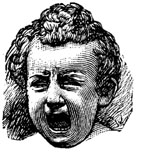
Please Don’t Bless My Children
GUEST COLUMN
Sometimes a practice creeps into the Mass that nobody seems to notice, and upon which nobody comments. But for those to whom their Catholic faith really matters, the barely noticed and gradually ubiquitous practice is a source of discomfort and concern. Take, for example, the distracting and uncomfortable custom of peer-pressured hand-holding during the Our Father. A number of orthodox voices were raised against it and, in some parishes, the inappropriate hand-holding diminished.
Nowadays, another practice has crept into the Mass in various dioceses throughout the country. It seems a very sensitive area, and objections to it are likely to offend a large number of people. But my concern is the proper worship of God, not approval among men. But how do you tell a sweet little old lady who loves the Lord and cheerfully does her best to assist at Mass that what she’s doing might not be the best way to honor God?
Quite some time ago, there developed among priests distributing Communion at Mass the custom of placing their hands on the heads of children too young to receive the Sacrament to bless them. I have no objection to this practice at Mass, as long as the person blessing the children is an ordained priest (or deacon). However, as time has passed and more and more Eucharistic ministers have been distributing Communion at Mass, these helpful, but non-ordained, persons have taken it upon themselves — or have been instructed — to bless children in the manner of an ordained priest. And herein lies the rub: It does not seem appropriate for the non-ordained to bless children at Mass.
You May Also Enjoy
The word "church" has been replaced with less religious-sounding terms, like worship center, family center, family life center, praise center, or outreach center.
The Pope's decision to allow women into two “minor orders” of the Church shows how significant change can be instituted incrementally.
Heaven is often compared to a lavish banquet. But somehow we can't imagine that it involves toilet paper and balloons.

